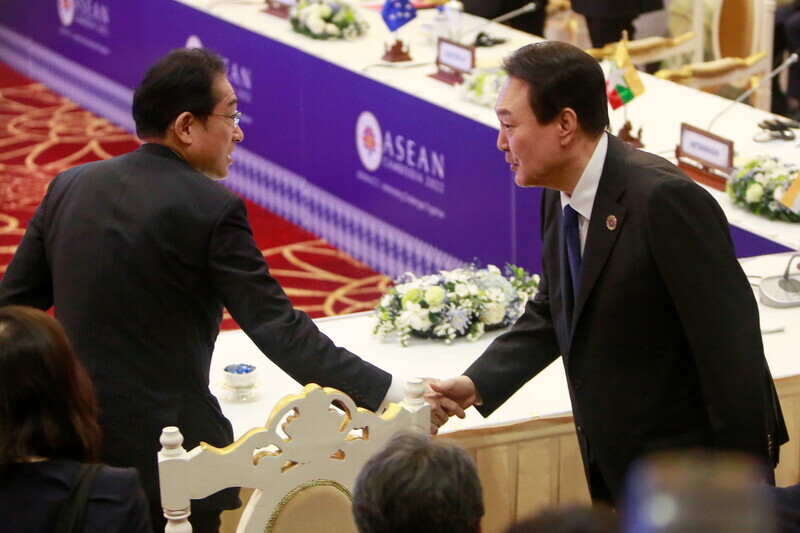hankyoreh
Links to other country sites 다른 나라 사이트 링크
Japan’s Kishida light on details regarding talks on wartime forced labor issue resolution with Yoon

Japanese Prime Minister Fumio Kishida said after a summit with his South Korean counterpart that he agreed in principle with an early resolution to the issue of compensation for survivors of forced labor mobilization during Japan’s occupation of Korea.
But he did not include any mention of the actual discussions that were held on the issue.
Speaking to reporters after the summit in Phnom Penh, Cambodia, on Sunday, Kishida said, “With regard to the matter of workers from the Korean Peninsula [forced mobilization victims], in light of the increasingly swift progress being made in discussions among diplomatic officials based on the directions that President Yoon Suk-yeol and I gave in New York, we agreed once again that we should resolve the matter swiftly.”
Yoon and Kishida previously met in New York in September on the sidelines of a UN General Assembly session, in a meeting that the Japanese government referred to as a “conference” and the South Korean government described as a “pull-aside summit.”
Kishida also said he had “confirmed” with Yoon plans to link North Korea issues to the realization of a “free and open Indo-Pacific.”
Commenting on a trilateral summit held with the US ahead of the bilateral encounter, Kishida said, “North Korea has been continuing to engage in provocations with unprecedented frequency and in unprecedented ways, and it is expected to engage in additional provocations.”
“Under these circumstances, linkages between Japan and the US, between Japan and South Korea, and among Japan, the US, and South Korea are assuming greater importance,” he stressed.
“We have agreed on the need to respond resolutely in pursuit of North Korea’s safe denuclearization,” he added.
This was the first official summit between South Korea and Japan in two years and 11 months, the last having been a meeting in November 2019 between then-South Korean President Moon Jae-in and late former Japanese Prime Minister Shinzo Abe in Chengdu, China.
Previously, the Japanese government had insisted that it could not hold a summit with South Korea until the latter came forward with a solution on a South Korean Supreme Court ruling ordering damages to be paid to victims of Japan’s forced labor mobilization.
Remarking on the change in Tokyo’s stance and its agreement to take part in a summit, the Asahi Shimbun newspaper commented that the North Korean nuclear weapon and missile issue was “a factor,” noting the “need for linkages between Japan and South Korea” along with “US demands for improvements to Japan-South Korea relations.”
The newspaper also quoted an official with the Japanese prime minister’s office as saying it had become “impossible to insist that there cannot be a summit until the [forced labor mobilization] issue is resolved.”
But another factor may be the low approval ratings for Kishida’s Cabinet. A survey by the NHK network last month calculated them at 38%, owing to issues related to Abe’s state funeral and the Unification Church, among other factors.
Under the circumstances, many in Japan had been skeptical about Kishida’s ability to exercise initiative in improving ties with Seoul.
By Cho Ki-weon, staff reporter
Please direct questions or comments to [english@hani.co.kr]

Editorial・opinion
![[Editorial] Intensifying US-China rivalry means Seoul must address uncertainty with Beijing sooner than later [Editorial] Intensifying US-China rivalry means Seoul must address uncertainty with Beijing sooner than later](https://flexible.img.hani.co.kr/flexible/normal/500/300/imgdb/original/2024/0517/8117159322045222.jpg) [Editorial] Intensifying US-China rivalry means Seoul must address uncertainty with Beijing sooner than later
[Editorial] Intensifying US-China rivalry means Seoul must address uncertainty with Beijing sooner than later![[Column] When ‘fairness’ means hate and violence [Column] When ‘fairness’ means hate and violence](https://flexible.img.hani.co.kr/flexible/normal/500/300/imgdb/original/2024/0516/7417158465908824.jpg) [Column] When ‘fairness’ means hate and violence
[Column] When ‘fairness’ means hate and violence- [Editorial] Yoon must stop abusing authority to shield himself from investigation
- [Column] US troop withdrawal from Korea could be the Acheson Line all over
- [Column] How to win back readers who’ve turned to YouTube for news
- [Column] Welcome to the president’s pity party
- [Editorial] Korea must respond firmly to Japan’s attempt to usurp Line
- [Editorial] Transfers of prosecutors investigating Korea’s first lady send chilling message
- [Column] Will Seoul’s ties with Moscow really recover on their own?
- [Column] Samsung’s ‘lost decade’ and Lee Jae-yong’s mismatched chopsticks
Most viewed articles
- 1[Editorial] Transfers of prosecutors investigating Korea’s first lady send chilling message
- 2[Column] US troop withdrawal from Korea could be the Acheson Line all over
- 3[Column] When ‘fairness’ means hate and violence
- 4[Editorial] Intensifying US-China rivalry means Seoul must address uncertainty with Beijing sooner t
- 5China calls US tariffs ‘madness,’ warns of full-on trade conflict
- 6‘Shot, stabbed, piled on a truck’: Mystery of missing dead at Gwangju Prison
- 7[Exclusive] Unearthed memo suggests Gwangju Uprising missing may have been cremated
- 8Xi, Putin ‘oppose acts of military intimidation’ against N. Korea by US in joint statement
- 9China, Russia put foot down on US moves in Asia, ratchet up solidarity with N. Korea
- 10Putin’s trip to China comes amid 63% increase in bilateral trade under US-led sanctions